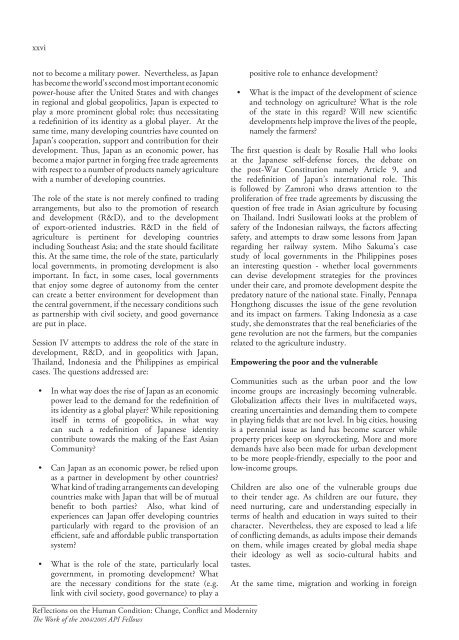Reflections on the Human Condition - Api-fellowships.org
Reflections on the Human Condition - Api-fellowships.org
Reflections on the Human Condition - Api-fellowships.org
Create successful ePaper yourself
Turn your PDF publications into a flip-book with our unique Google optimized e-Paper software.
26<br />
xxvi<br />
not to become a military power. Never<strong>the</strong>less, as Japan<br />
has become <strong>the</strong> world’s sec<strong>on</strong>d most important ec<strong>on</strong>omic<br />
power-house after <strong>the</strong> United States and with changes<br />
in regi<strong>on</strong>al and global geopolitics, Japan is expected to<br />
play a more prominent global role; thus necessitating<br />
a redefiniti<strong>on</strong> of its identity as a global player. At <strong>the</strong><br />
same time, many developing countries have counted <strong>on</strong><br />
Japan’s cooperati<strong>on</strong>, support and c<strong>on</strong>tributi<strong>on</strong> for <strong>the</strong>ir<br />
development. Thus, Japan as an ec<strong>on</strong>omic power, has<br />
become a major partner in f<strong>org</strong>ing free trade agreements<br />
with respect to a number of products namely agriculture<br />
with a number of developing countries.<br />
The role of <strong>the</strong> state is not merely c<strong>on</strong>fined to trading<br />
arrangements, but also to <strong>the</strong> promoti<strong>on</strong> of research<br />
and development (R&D), and to <strong>the</strong> development<br />
of export-oriented industries. R&D in <strong>the</strong> field of<br />
agriculture is pertinent for developing countries<br />
including Sou<strong>the</strong>ast Asia; and <strong>the</strong> state should facilitate<br />
this. At <strong>the</strong> same time, <strong>the</strong> role of <strong>the</strong> state, particularly<br />
local governments, in promoting development is also<br />
important. In fact, in some cases, local governments<br />
that enjoy some degree of aut<strong>on</strong>omy from <strong>the</strong> center<br />
can create a better envir<strong>on</strong>ment for development than<br />
<strong>the</strong> central government, if <strong>the</strong> necessary c<strong>on</strong>diti<strong>on</strong>s such<br />
as partnership with civil society, and good governance<br />
are put in place.<br />
Sessi<strong>on</strong> IV attempts to address <strong>the</strong> role of <strong>the</strong> state in<br />
development, R&D, and in geopolitics with Japan,<br />
Thailand, Ind<strong>on</strong>esia and <strong>the</strong> Philippines as empirical<br />
cases. The questi<strong>on</strong>s addressed are:<br />
•<br />
•<br />
•<br />
In what way does <strong>the</strong> rise of Japan as an ec<strong>on</strong>omic<br />
power lead to <strong>the</strong> demand for <strong>the</strong> redefiniti<strong>on</strong> of<br />
its identity as a global player? While repositi<strong>on</strong>ing<br />
itself in terms of geopolitics, in what way<br />
can such a redefiniti<strong>on</strong> of Japanese identity<br />
c<strong>on</strong>tribute towards <strong>the</strong> making of <strong>the</strong> East Asian<br />
Community?<br />
Can Japan as an ec<strong>on</strong>omic power, be relied up<strong>on</strong><br />
as a partner in development by o<strong>the</strong>r countries?<br />
What kind of trading arrangements can developing<br />
countries make with Japan that will be of mutual<br />
benefit to both parties? Also, what kind of<br />
experiences can Japan offer developing countries<br />
particularly with regard to <strong>the</strong> provisi<strong>on</strong> of an<br />
efficient, safe and affordable public transportati<strong>on</strong><br />
system?<br />
What is <strong>the</strong> role of <strong>the</strong> state, particularly local<br />
government, in promoting development? What<br />
are <strong>the</strong> necessary c<strong>on</strong>diti<strong>on</strong>s for <strong>the</strong> state (e.g.<br />
link with civil society, good governance) to play a<br />
Ref lecti<strong>on</strong>s <strong>on</strong> <strong>the</strong> <strong>Human</strong> C<strong>on</strong>diti<strong>on</strong>: Change, C<strong>on</strong>flict and Modernity<br />
The Work of <strong>the</strong> 2004/2005 API Fellows<br />
•<br />
positive role to enhance development?<br />
What is <strong>the</strong> impact of <strong>the</strong> development of science<br />
and technology <strong>on</strong> agriculture? What is <strong>the</strong> role<br />
of <strong>the</strong> state in this regard? Will new scientific<br />
developments help improve <strong>the</strong> lives of <strong>the</strong> people,<br />
namely <strong>the</strong> farmers?<br />
The first questi<strong>on</strong> is dealt by Rosalie Hall who looks<br />
at <strong>the</strong> Japanese self-defense forces, <strong>the</strong> debate <strong>on</strong><br />
<strong>the</strong> post-War C<strong>on</strong>stituti<strong>on</strong> namely Article 9, and<br />
<strong>the</strong> redefiniti<strong>on</strong> of Japan’s internati<strong>on</strong>al role. This<br />
is followed by Zamr<strong>on</strong>i who draws attenti<strong>on</strong> to <strong>the</strong><br />
proliferati<strong>on</strong> of free trade agreements by discussing <strong>the</strong><br />
questi<strong>on</strong> of free trade in Asian agriculture by focusing<br />
<strong>on</strong> Thailand. Indri Susilowati looks at <strong>the</strong> problem of<br />
safety of <strong>the</strong> Ind<strong>on</strong>esian railways, <strong>the</strong> factors affecting<br />
safety, and attempts to draw some less<strong>on</strong>s from Japan<br />
regarding her railway system. Miho Sakuma’s case<br />
study of local governments in <strong>the</strong> Philippines poses<br />
an interesting questi<strong>on</strong> - whe<strong>the</strong>r local governments<br />
can devise development strategies for <strong>the</strong> provinces<br />
under <strong>the</strong>ir care, and promote development despite <strong>the</strong><br />
predatory nature of <strong>the</strong> nati<strong>on</strong>al state. Finally, Pennapa<br />
H<strong>on</strong>gth<strong>on</strong>g discusses <strong>the</strong> issue of <strong>the</strong> gene revoluti<strong>on</strong><br />
and its impact <strong>on</strong> farmers. Taking Ind<strong>on</strong>esia as a case<br />
study, she dem<strong>on</strong>strates that <strong>the</strong> real beneficiaries of <strong>the</strong><br />
gene revoluti<strong>on</strong> are not <strong>the</strong> farmers, but <strong>the</strong> companies<br />
related to <strong>the</strong> agriculture industry.<br />
Empowering <strong>the</strong> poor and <strong>the</strong> vulnerable<br />
Communities such as <strong>the</strong> urban poor and <strong>the</strong> low<br />
income groups are increasingly becoming vulnerable.<br />
Globalizati<strong>on</strong> affects <strong>the</strong>ir lives in multifaceted ways,<br />
creating uncertainties and demanding <strong>the</strong>m to compete<br />
in playing fields that are not level. In big cities, housing<br />
is a perennial issue as land has become scarcer while<br />
property prices keep <strong>on</strong> skyrocketing. More and more<br />
demands have also been made for urban development<br />
to be more people-friendly, especially to <strong>the</strong> poor and<br />
low-income groups.<br />
Children are also <strong>on</strong>e of <strong>the</strong> vulnerable groups due<br />
to <strong>the</strong>ir tender age. As children are our future, <strong>the</strong>y<br />
need nurturing, care and understanding especially in<br />
terms of health and educati<strong>on</strong> in ways suited to <strong>the</strong>ir<br />
character. Never<strong>the</strong>less, <strong>the</strong>y are exposed to lead a life<br />
of c<strong>on</strong>flicting demands, as adults impose <strong>the</strong>ir demands<br />
<strong>on</strong> <strong>the</strong>m, while images created by global media shape<br />
<strong>the</strong>ir ideology as well as socio-cultural habits and<br />
tastes.<br />
At <strong>the</strong> same time, migrati<strong>on</strong> and working in foreign

















